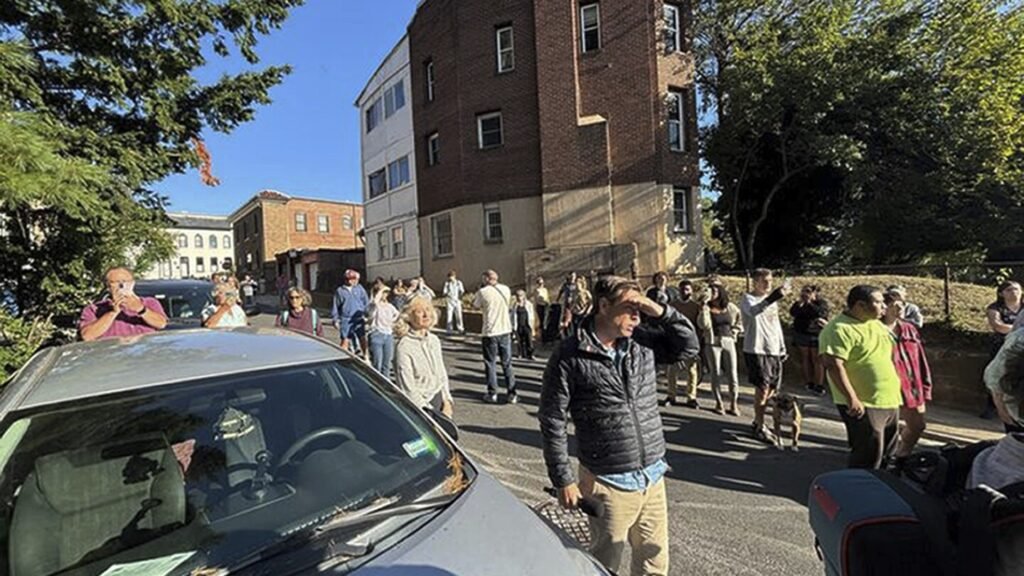A routine arrest turned dramatic confrontation Wednesday morning in Mount Nice, as armed officers from native and federal companies—together with the ATF—raided an condo block mere steps from Bancroft Elementary Faculty. The presence of masked and rifle-bearing officers prompted residents to hurry into the road, chanting “Your disgrace” and imploring the officers to depart. The incident comes amid an unprecedented enlargement of President Trump’s federal legislation enforcement operations within the capital.
On the block outdoors the college, a neighbor confronted officers: “Why couldn’t this be executed at 9:30 or 10:30? You terrified children,” he mentioned. The officers, clad in tactical gear and sun shades, provided no response. The near-school deployment deeply unsettled households, notably as courses had been newly resumed for kids—together with many Latino college students—who had been being dropped off by more and more anxious dad and mom.
Since Trump invoked Part 740 of the D.C. Dwelling Rule Act on Aug. 11—marking the primary such federal takeover of native legislation enforcement—the town has seen a surge of federal brokers, ICE, FBI, ATF and Nationwide Guard presence in D.C. neighborhoods. Though the transfer got here amid an official crime emergency, statistics present violent crime in D.C. was already at a 30-year low.
Mayor Muriel Bowser has walked a tightrope—endorsing the decline in crime beneath federal suppression whereas warning of a rising “break in belief” with residents uncomfortable with masked ICE brokers and Nationwide Guard troops patrolling civilian areas.
Native advocacy teams, together with Poder del Pueblo, have fervently opposed the federal presence, demanding investments in community-led security packages as a substitute of militarized policing. As eating places reported as much as a 31% drop in reservations, enterprise homeowners warned the crackdown was chilling metropolis life, notably amongst immigrant communities.
The raid in Mount Nice not solely disrupted an early college day—it created a civic rupture. The strain that morning encapsulated bigger fears: that D.C.’s autonomy is eroding and youngsters are rising up in a local weather of intimidation. Assistant principals waited to greet college students; dad and mom feared crossing the road.
Police makes an attempt to deescalate fell quick. In accordance with Sergeant Michael Millsapps, the operation was a “routine warrant” executed with ATF help, and ICE brokers had been current solely to distract protestors—to not arrest. Nonetheless, many residents mentioned they felt their belief in police was shattered. The dissonance between official explanations and native notion was palpable—particularly in opposition to a backdrop of earlier tense enforcement actions, together with ICE eradicating a pro-immigrant banner and abandoning a disturbing object.
Critics argue that deploying federal forces into neighborhoods with traditionally robust neighborhood bonds—with out addressing root causes—is a heavy-handed repair. Areas like Mount Nice, identified for cultural vibrancy and stability, really feel violated. One longtime resident lamented, “That is normally a quiet, blended neighborhood. We don’t want extra police—we’d like respect.”
The disaster is emblematic of bigger nationwide tensions. Many residents imagine the surge displays political posturing greater than public security. As Councilmembers and native leaders decry federal overreach, authorized specialists warn the intervention could breach D.C.’s restricted home-rule authority, setting a harmful precedent for future cities.
A ballot carried out after the takeover discovered that 80% of residents opposed the federal deployment—at the same time as arrests mounted and crime continued to fall. Mayor Bowser and metropolis officers are calling for a measured transition again to native management and urging extra clear and community-oriented policing methods.
The Mount Nice confrontation, although centered on one arrest, symbolizes a deeper fracture in Washington’s civic panorama. Balancing security, democratic norms, and neighborhood belief could demand greater than federal pressure—it might require reconnection with the material of the neighborhood itself.
For Mount Nice residents, the episode strengthened a broader sense of unease about what sort of metropolis Washington, D.C. is changing into beneath the burden of federal intervention. What as soon as felt like a neighborhood outlined by neighborhood colleges, cultural pleasure, and immigrant resilience now appears like a frontline in a political battle far bigger than the block itself. Whether or not D.C. can protect its identification amid Trump’s enforcement surge could rely much less on crime statistics and extra on whether or not belief between residents and authorities may be restored.


